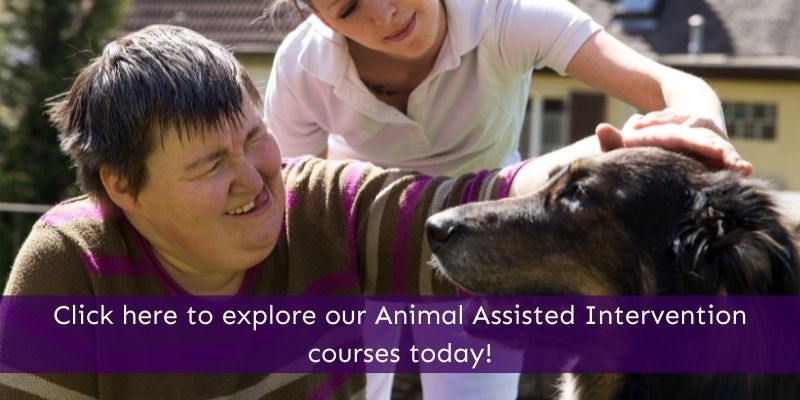Anyone who likes the company of animals knows all too well how soothing their presence can be. Studies have shown that just owning a pet can benefit our physical, social, and psychological well-being, with the simplest of actions like stroking relaxing us to the point it reduces blood pressure.
It’s no wonder then that there have been advocates for animals in healthcare for many years. In the words of Florence Nightingale, “A small pet is often an excellent companion for the sick, especially for the chronic cases”. The numerous benefits stemming from the presence of animals have cemented their place in therapy and led to the emergence of (AAI) Animal Assisted Intervention.
What is Animal Assisted Intervention?
The Animal Assisted Intervention definition according to Animal Assisted Intervention International is:A goal-directed intervention (that) is designed to promote improvement in physical, social, emotional and/or cognitive functioning of the person(s) involved and in which a specially trained animal-handler team is an integral part.
These animal intervention sessions are ideally set with specific goals for each individual in mind. Though, they can also be casual and spontaneous depending on the needs of the individual. Either way, the intervention process will be documented and evaluated.
In most cases, you will find dogs being used for Animal Assisted Interventions as their intelligence, ability to recognise human emotions and other desirable traits make them a preferred choice for this kind of human treatment.
However, other AAI animals can include:
- Birds
- Cats
- Dolphins
- Fish
- Goats
- Guinea pigs
- Horses
- Llamas
- Pigs

Where Can Animal Assisted Interventions Take Place?
Animal Assisted Interventions can be carried out in many settings. They can also be provided to people in a group or by themselves, and people of all ages.Just some of the environments where Animal Assisted Interventions can take place include:
- Colleges
- Schools
- SEN Schools
- Hospices
- Hospitals
- Prisons
- Nursing homes
- In a person’s home
- In other community locations
Animal Assisted Intervention Examples
There are many different types of Animal Assisted Interventions, as AAI is the umbrella term for numerous activities that involve the presence of animals for human benefit.Under the umbrella term of Animal Assisted Intervention, you have:
Animal Assisted Activity (AAA)
AAAs are more informal activities that enhance a person's quality of life by providing opportunities for motivational, educational, and/or recreational benefits.Animal Assisted Activities can involve anything from:
- At-risk youth visits
- Crisis response visits
- Hospice visits
- Hospital visits
- Memory care
- Nursing home visits
- Stress reduction visits
- Workplace wellbeing visits
Animal Assisted Education (AAE)
AAE is more formal, as each session is planned, structured and goal oriented. Animal Assisted Education sessions will also be directed by a general education or special education professional.The AAE sessions typically revolve around:
- Human education
- Reading and literacy

Animal Assisted Therapy (AAT)
AAT sessions are another formal and documented form of therapeutic intervention and are directed by health and human service providers.The practitioners delivering Animal Assisted Therapy can include:
- Certified Therapeutic Recreation Specialists
- Mental Health Professionals
- Nurses
- Occupational Therapists
- Physicians
- Physical Therapists
- Speech Therapists
- Social Workers
Health Benefits Of Animal Assisted Interventions
While there are many different types of Animal Assisted Intervention, the health benefits are vast and don’t just apply to one age group. While not as common a practice in the UK as in other global areas, the benefits of AAI are becoming more widely known and are now being filtrated into the UK’s healthcare system.Now, the people who can benefit from Animal Assisted Intervention, UK based, include:
- Adolescents
- Adults
- Children
- Anxiety
- Blood pressure
- Depression
- Feelings of loneliness
- Heart rate
- Perceived quality of health
- Salivary immunoglobulin A levels, and more

Study An Animal Assisted Intervention Course
If you have a driving passion to help people achieve their goals, and a love of animals, you can combine the two in a rewarding and important career. Animal Assisted Intervention jobs require the knowledge and expertise of trained professionals to provide this increasingly in-demand form of treatment to people with identified needs.Animal Courses Direct provide an online Level 3 Diploma in Animal Assisted Intervention. This is available to anyone over the age of 16 and, while you have two years to study, the course can take less than a year to complete. By studying this diploma, you will gain an Animal Assisted Intervention certificate that confirms you have the skills and expertise service providers are looking for.
Throughout the online AAI course, you will explore a range of vital topics, including:
- History of Animal Assisted Intervention Therapy
- The Use of Animal Assisted Intervention
- Legal Responsibilities in Animal Assisted Intervention
- Animal Assisted Intervention Roles
- Client and Animal Matching in Animal Assisted Intervention
- Selection, Training and Welfare of Animal Assisted Intervention Animals
- Disabilities and Animal Assisted Intervention
- Skills for Working in Animal Assisted Intervention
- Practical Training in Animal Assisted Intervention
Enrol Today
Animal Assisted Intervention has been receiving growing attention as a legitimate form of treatment for many conditions in the scientific fields of nursing, medicine, and psychotherapy, among others. If you would like to get the skills to kick-start a career in this field, we can help you take the first step.Contact our Course Advisors today to find out more about the course, the Animal Assisted Intervention jobs it can help you start and the benefits of choosing to study online through Animal Courses Direct.
Call our team now on 01202 006 040 or speak with us online. Alternatively, you can read more in our blog or click below to view our Animal Assisted Intervention course in more detail.
Also, if you adore animals, you can keep track of all upcoming animal awareness days and events with our FREE calendar! Download it here.

















